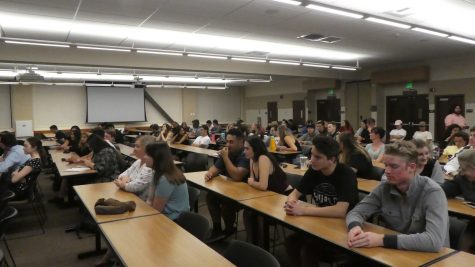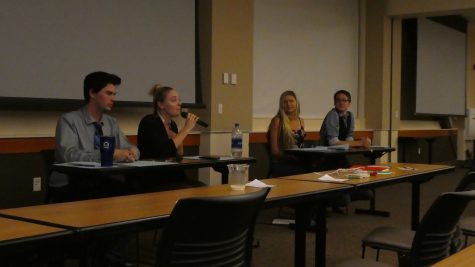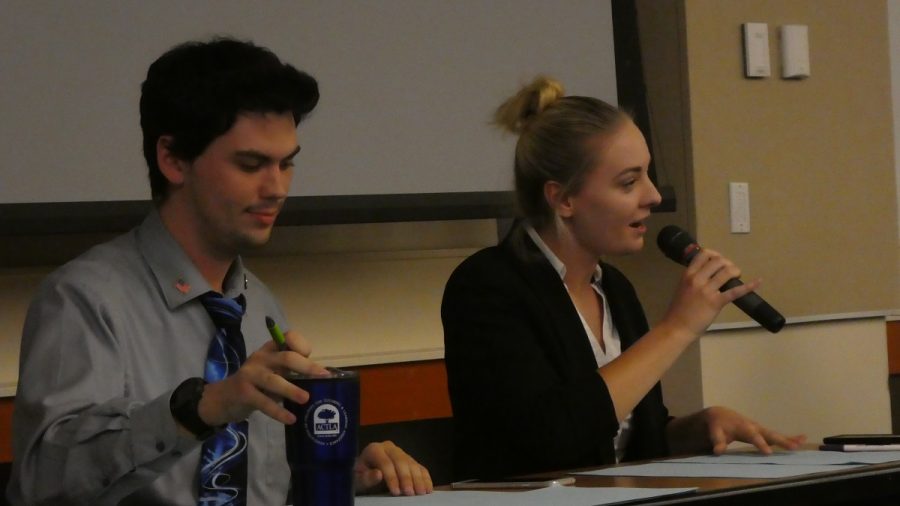The sounds of fists banging down on tables filled the air of Colusa Hall, Friday night, at Chico State’s 16th annual The Great Debate.
This year the topic for discussion was titled “Resolved: YouTube causes more harm than good for democracy.” The debate modeled the British system’s parliamentary style debate—a more lively style where the audience pounds their fists on the table to show approval of the arguments being made—and teams of two took turns making their arguments and rebutting the other’s. Talking points included the spread of fake news and fact-checking, increasing education and allowing politicians to easily reach a wider audience.

The debater’s came from Chico State’s Speech and Debate Team. Arguing for the affirmative—the team agreeing with the claim YouTube does more harm than good—were debaters Christian Wilson and Kelsey McCaffrey, while debaters for the opposite side were Jasmin Hovey and Cody Peterson. Each were given the opportunity to speak twice, for five minutes each.

McCaffrey opened by bringing up fake news.
“Trust me, I hate using that word too, but it’s true,” McCaffrey said.
She went on to explain how after the mass shooting in Las Vegas eight of the the top ten results for search of victims names resulted in conspiracy theories of them being crisis actors.
Following McCaffrey’s arguments, Peterson spoke on the negative argument, stating YouTube does not cause more harm than good and highlighting its ability to increase education through easier access to educational videos.
“There are pages like John Green, The vlogbrothers, minutephysics, CrashCourse,” Peterson said. “How many of you guys have used that site studying for a test?”
He immediately received a thunderous pounding of fists on tables in support from most of the crowd.
He agreed that anyone can post on YouTube, but that doesn’t mean everyone is posting conspiracy theories.
Next up for the affirmative side, Wilson spoke further on the spread of fake news. He agreed with the negative’s side of increasing access to educational videos, but how that is not always necessarily a good thing, after looking up flat-earther documentaries.
“Yes, YouTube has a lot of very educational videos…but here’s thing, those flat-earther documentaries, they labeled themselves as educational videos, they show up in YouTube Edu,” Wilson said.
Hovey came back on the negative side, explaining that people aren’t that dumb. She said YouTube’s terms of service clearly explain that you may be exposed to inaccurate news, but that people can figure it out.
“If Christian was able to figure out (that was fake news) I think that all of you can as well,” Hovey said, receiving another round of enthusiastic table pounding from the audience.
She also mentioned that in the 2008 election seven of 16 candidates announced their candidacy on YouTube first, giving a platform to those who may not have had such an accessible one.
At the end, by a show of hands, it was clear that most people agreed with the negative side of the debate, that YouTube has not done more harm than good.






Thato // May 4, 2021 at 3:52 pm
I would like you to help me come up with some facts for my debate on Thursday on YouTube does more good than harm both on the proposing and opposing
Mohau Seoloana // Mar 16, 2021 at 6:24 pm
I would like you tell him me for an upcoming debate on 27th of March about the topic YouTube does more harm than good.
Takatso // Mar 15, 2021 at 10:04 am
I would like you to help me come up with facts for my debate Tommorow on YouTube does more good than harm for opposing and proposing sides